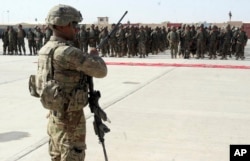Top U.S. officials are reassuring Afghanistan of continuing American support amid questions about President Donald Trump’s commitment to the country.
White House spokesman Sean Spicer said National Security Adviser Michal Flynn reaffirmed “our continued support for Afghanistan and for our strategic partnership” to his Afghan counterpart Tuesday.
Defense Secretary Jim Mattis also called Afghan President Ashraf Ghani to “discuss the enduring U.S.-Afghan strategic relationship,” according to a Pentagon statement, adding that both leaders “look forward to engaging again in the near future.”
Hamdullah Mohib, Afghanistan's ambassador in Washington, also put a positive spin on the contacts, saying: “Our relationship with the new administration is off to a very strong start.” He said he was confident that the new White House “recognizes the enormous value of its partnership with Afghanistan and the critical importance of having a strong ally in the fight against terrorism and in our volatile region of the world.”
In terms of what Afghanistan wants from the new administration, Mohib identified "a U.S. commitment to the fight against terrorism based on strategic goals” and help developing Afghanistan's economic potential, citing the country's rich natural resources, particularly the mining sector that is just beginning to develop.
However, some critics of the Trump administration’s foreign policy question the strength of the relationship.
Barnett Rubin, head of the Center on International Cooperation at New York University and writer of several books on Afghanistan said he’s convinced that “Trump does not believe in the mission” but will keep U.S. troops there "begrudgingly" for a while to keep the government from collapsing.
“Trump policies in the U.S. and around the world will make the U.S. less and less welcome in Afghanistan,” Rubin said in an interview with VOA. He cited Trump’s confrontational statements about China and possible sanctions on Iran, saying they “will make it impossible” for Afghanistan to reduce dependence on Pakistan.
Afghanistan’s trade with Pakistan has plunged over the last year while rising with Iran.
The Afghan government sees Pakistan as a major player in restoring peace in Afghanistan, but Rubin says “Afghans who think he [Trump] will be tough on Pakistan to support the Afghan government are deceiving themselves.”
Rubin said the U.S. president “may try to cooperate with Russia on its regional initiative, but then he has to cooperate with Iran and China too, and maybe with the Taliban.”
Russia, which had its own long intervention in Afghanistan, says it will soon host Afghan peace talks involving China, Pakistan, India, Iran and Afghanistan, but the invitation has not included the United States. Some experts say the Taliban has to be a player in the peace process to avoid failure.
Afghanistan’s strategic location in the heart of Asia is important because it’s “the only country in the region that is friendly towards the United States and is willing to host U.S. forces,” said Sherjan Ahmadzai, director of the Afghanistan Study Center at the University of Nebraska.
That would allow the U.S. to address “any potential threat emanating from that region to which it cannot respond from offshore bases or ships in Indian Ocean or in Turkey,” Ahmadzai said.





